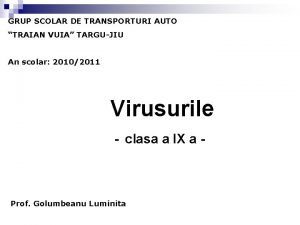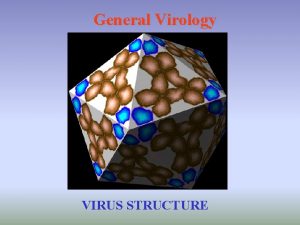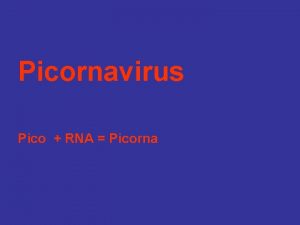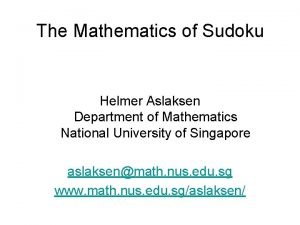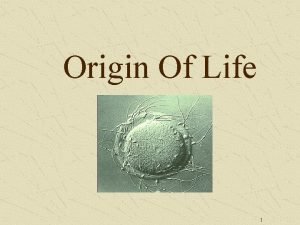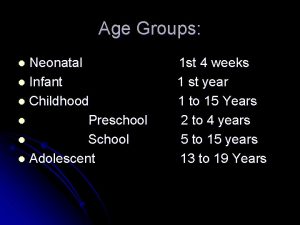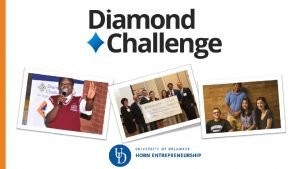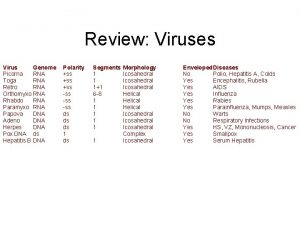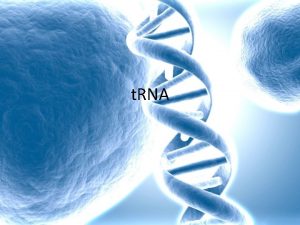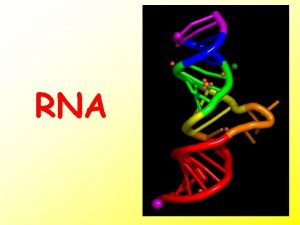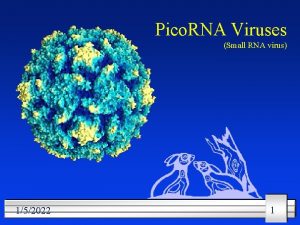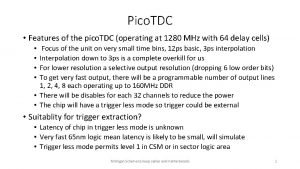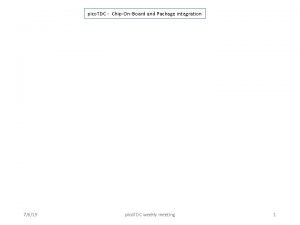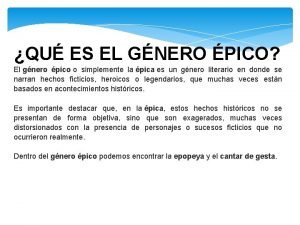Picornavirus Pico RNA Picorna Virion is a naked





























- Slides: 29

Picornavirus Pico + RNA = Picorna

• Virion is a naked, small (25 to 30 nm) icosahedral capsid enclosing a single-stranded positive RNA genome. Box 56 -2. Unique Properties of Human Picornaviruses • Enteroviruses are resistant to p. H 3 to p. H 9, detergents, mild sewage treatment, and heat. • Rhinoviruses are labile at acidic p. H; optimum growth temperature is 33° C. • Genome is an m. RNA. (+ sense) • Naked genome is sufficient for infection. • Virus replicates in cytoplasm. • Viral RNA is translated into polyprotein, which is then cleaved into enzymatic and structural proteins. • Most viruses are cytolytic

Picornaviridae • Enterovirus • Poliovirus types 1, 2, and 3 • Coxsackie A virus types 1 to 22 and 24 • Coxsackie B virus types 1 to 6 Body_ID: B 056001 • Echovirus (ECHO virus) types 1 - 9, 11 - 27, 29 - 34 • Enterovirus 68 to 71 and 73 to …. • Parechovirus (formerly echovirus 22, 23) • Kobuvirus: Aichi virus and Ljungan virus • Hepatovirus -Hepatitis A virus • Rhinovirus types 1 to 100+ Animal viruses: • Cardiovirus • Aphthovirus ….




• e. IF 4 G cleaved cellular protein synthesis is shut off

Kozak sequence (NNNPu. NNA UGG ) The initiation AUG codon in the polio virus open reading frame is preceded by eight other AUGs. RCCAUGG RYYAUGG (R = purine, Y = pyrimidine);

Disease Mechanisms of Picornaviruses • Enteroviruses enter via the oropharynx, intestinal mucosa, or upper respiratory tract and infect the underlying lymphatic tissue; rhinoviruses Body_ID: B 056003 are restricted to the upper respiratory tract • In the absence of serum antibody, enterovirus spreads by viremia to cells of a receptor-bearing target tissue • Different picornaviruses bind to different receptors, many of which are members of the immunoglobulin superfamily (i. e. , ICAM-1) • The infected target tissue determines the subsequent disease • Viral, rather than immune, pathologic effects are usually responsible for causing disease symptoms • The secretory antibody response is transistory but can prevent the initiation of infection • Serum antibody blocks viremic spread to target tissue, preventing symptoms • Enterovirus is shed in feces for long periods • Infection is often asymptomatic or causes mild, flulike or upper respiratory tract disease


Epidemiology of Enterovirus Infections Disease/Viral Factors • Nature of disease correlates with specific enterovirus and age of person • Infection often asymptomatic, with viral shedding • Virion resistant to environmental conditions (detergents, acid, drying, mild sewage treatment, and heat) Transmission • Fecal-oral route: poor hygiene, dirty diapers (especially in daycare settings) • Ingestion via contaminated food and water • Contact with infected hands and fomites • Inhalation of infectious aerosols Body_ID: B 056004 Body_ID: PB 056004

Who Is at Risk? Body_ID: B 056004 • Young children: at risk for polio (asymptomatic or mild disease) • Older children and adults: at risk for polio (asymptomatic to paralytic disease) • Newborns and neonates: at highest risk for serious coxsackievirus and enterovirus disease Geography/Season • Viruses have worldwide distribution; wild-type polio virtually eradicated in developed countries because of vaccination programs • Disease more common in summer Modes of Control Body_ID: PB 056004 • For polio, live oral polio vaccine (trivalent OPV) or inactivated trivalent polio vaccine (IPV) is administered • For other enteroviruses, no vaccine; good hygiene limits spread



Poliovirus infection • • • Asymptomatic illness results if the viral infection is limited to the oropharynx and the gut. At least 90% of poliovirus infections are asymptomatic. Abortive poliomyelitis, the minor illness, is a nonspecific febrile illness occurring in approximately 5% of infected people. Fever, headache, malaise, sore throat, and vomiting occur in such people within 3 to 4 days of exposure. Nonparalytic poliomyelitis or aseptic meningitis occurs in 1% to 2% of patients with poliovirus infections. In this disease, the virus progresses into the central nervous system and the meninges, causing back pain and muscle spasms in addition to the symptoms of the minor illness.

• Paralytic polio, the major illness, occurs in 0. 1% to 2. 0% of persons with poliovirus infections and is the most severe outcome. It appears 3 to 4 days after the minor illness has subsided, thereby producing a biphasic illness. In this disease, the virus spreads from the blood to the anterior horn cells of the spinal cord and to the motor cortex of the brain. The severity of paralysis is determined by the extent of the neuronal infection and by which neurons are affected. Spinal paralysis may involve one or more limbs, whereas bulbar (cranial) paralysis may involve a combination of cranial nerves and even the medullary respiratory center. • Paralytic poliomyelitis is characterized by an asymmetrical flaccid paralysis with no sensory loss. Poliovirus type 1 is responsible for 85% of the cases of paralytic polio. Reversion of the attenuated vaccine virus types 2 and 3 to virulence can cause vaccine-associated disease.



Coxsackievirus and Echovirus Infections

• Herpangina Type A 1 -10 Type B 1 -5 Echoviruses Mostly in children; epidemicin summer months Abrupt fever, sore throat, anorexia, abdominal pain and vesicles on soft palate, pharinx and tonsills

Hand-foot-and-mouth disease • Coxsackie A 16, 4, 5, 10

Myocardial and pericardial infections • Coxsackie B, echovirus • Sudden onset Diabetes: Coxsackie B 4

Viral (aseptic) meningitis • Coxsackie A, B • Echovirus • Summer and fall

Fever, rash, and common coldlike symptoms • Summer minor illnes: Rubelliform rush on face, neck and chest Accompanied by fever No distinctive feature Short duration

Plerodynia • Coxsackie B • Sudden chest pain, fever, malaise • (Abdominal or testicular pain)

Laboratory Diagnosis • CSF findings • Culture • Molecular and serological methods

Treatment and Prevention • Vaccine available only for Polio


Rhinoviruses • • • • Epidemiology of Rhinovirus Infections Disease/Viral Factors Virion is resistant to drying and detergents Multiple serotypes preclude prior immunity Replication occurs at optimum temperature of 33° C and cooler temperatures Transmission Direct contact via infected hands and fomites Inhalation of infectious droplets Who Is at Risk? People of all ages Geography/Season Virus found worldwide Disease more common in early autumn and late spring Modes of Control Washing hands and disinfecting contaminated objects help prevent spread
 Ribovirusuri exemple
Ribovirusuri exemple Virions
Virions Picorna virusi
Picorna virusi Aichi virus
Aichi virus Picornavirus familia
Picornavirus familia Reoviridae classification
Reoviridae classification Science olympiad egg drop
Science olympiad egg drop Bárbara montero nude
Bárbara montero nude Partes del cuerpo humano
Partes del cuerpo humano Helmer aslaksen
Helmer aslaksen Alex clarke naked
Alex clarke naked Spallanzani experiment
Spallanzani experiment Motives concealer
Motives concealer Brenda parkinson
Brenda parkinson Great contributors in the development of gymnastics
Great contributors in the development of gymnastics Pityriasis alba vs vitiligo
Pityriasis alba vs vitiligo Naked new presentation
Naked new presentation Naked
Naked اکسپرسیونیسم naked man with rat
اکسپرسیونیسم naked man with rat Naked naber
Naked naber Naked seeds
Naked seeds They were both naked
They were both naked Naked filipino
Naked filipino What sees
What sees Becca bowen naked
Becca bowen naked Ascomycota
Ascomycota Appreciate naked
Appreciate naked Numberblocks 3000
Numberblocks 3000 Operational shorting
Operational shorting Mundo naked
Mundo naked
